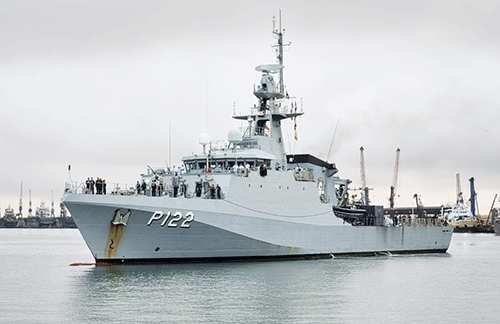Vivian Loss Sanmartin
Late president Hage G. Geingob once referred to the friendship of Brazil and Namibia as that of “neighbours, separated only by the sea.” Thanks to three decades of a successful naval partnership, Brazil and Namibia have truly become neighbours united by the Atlantic Ocean.
Today, 4 March 2024, we celebrate the 30th anniversary of the Brazil-Namibia Agreement for Naval Cooperation, which paved the way for Brazil’s biggest and strongest naval cooperation in Africa. As such, it is befitting to revisit some of the main events that marked this journey, and to look into new avenues of cooperation between our navies in the future.
The anniversary coincides with the celebration of 30 years since the handover of Walvis Bay and the offshore islands to Namibia on 28 February 1994, marking the consolidation of the Namibian territory.
Following the reintegration of Namibia’s main port city, local authorities welcomed, on 2 March 1994, the Brazilian Frigate ‘Niteroi’, the first military ship to enter Namibian waters after the return of Walvis Bay. On the same day, Brazil established a Naval Mission to Namibia, with the aim of supporting the creation and strengthening of the Namibian naval wing, which would become a fully-fledged force in 2004.
During its stay in Walvis Bay, the ‘Niteroi’ was honoured by a visit of president Sam Nujoma. It was also the stage for the signing ceremony of the naval agreement.
A landmark project between Brazil and Namibia under the agreement was the hydrographic survey of the Namibian coast, performed in 1997 by the Brazilian hydrographic vessel ‘Sirius’. The project led to the publication of the first nautical chart of the Walvis Bay harbour.
Revised and extended in 2001, the naval agreement allowed for 1 179 Namibian military personnel, comprising 90% of the navy staff, to receive training in Brazilian naval institutions within a period of 10 years. Since then, every year, new courses and trainings are offered to the Namibian Navy in areas as diverse as cartography, nautical sciences and military strategy.
From 2003 to 2006, Brazil provided naval consultancy to Namibia in preparing the documentation required by the United Nations Commission on the Limits of the Continental Shelf (CLCS) for the submission of a formal proposal regarding the Namibian continental shelf.
In 2004, the Brazilian government donated to the Namibian Navy the ‘Purus’ Corvette, which was re-baptised as ‘NS Lt-Gen Dimo Hamaambo’. The Brazilian Navy also provided specialised training, as well as technical and logistics assistance for the Namibian ship’s crew.
In 2009, Brazil supplied the Brazilian made 200-tonnes ‘Brendan Simbwaye’ navy patrol vessel, and two patrol boats of the ‘Marlim’ class. In the same year, the Brazilian Marines Advisory Technical Team in Walvis Bay was established, allowing for the training in Namibia of 723 privates and 209 non-commissioned officers, leading to the creation of the Namibian Marine Corps in 2016.
Since then, the Brazilian Marines have trained more than 1 400 Namibian marines in courses taught in the country, in addition to providing military, technical and administrative advice to the Marine Infantry Battalion, including the planning and execution of annual operational activities. Furthermore, under the bilateral naval cooperation, Brazilian Offshore Patrol Vessels have regularly visited Namibia as part of naval training exercises along the coast of Africa.
In September 2022, the ‘NS Elephant’ became the first Namibian vessel to cross the Atlantic Ocean to participate in the Brazilian celebration of the 200th anniversary of Brazil’s Independence, and take part in the multilateral naval exercise UNITAS LXIII in Rio de Janeiro.
Over three decades, the Brazil-Namibia naval partnership has made long strides in bringing our countries together as ocean-bonded neighbours, thus contributing to the strengthening of our bilateral ties and to a safer, more integrated South-Atlantic naval community.
Beyond our bilateral ties, Namibia and Brazil are members of the South Atlantic Peace and Cooperation Zone (APCZ), a community of 24 riverine countries from South America and West and Southern Africa. Created in 1986, the APCZ aims at ensuring that the South Atlantic remains an area free of nuclear weapons and weapons of mass destruction, where peaceful cooperation prevails. In the 21st century, these goals remain more relevant than ever.
As Namibia embarks on a new stage of economic development by exploring the abundant oil reserves recently discovered, challenges regarding security in its offshore zone will demand new solutions and actions. The Brazilian Navy, which has long been responsible for the security of Brazil’s oil and gas offshore platforms, stands ready to share its experience and expertise with Namibia.
The successful naval partnership between Brazil and Namibia is a source of pride and satisfaction to our countries. With its unique character, this collaboration created lasting bonds of friendship between two developing nations which share the common space of the South Atlantic, with its vast marine resources, while embracing the same values of peace and cooperation.
As such, let us celebrate together 30 years of the Brazil-Namibia Naval partnership!
* Vivian Loss Sanmartin is the ambassador of Brazil to Namibia.


